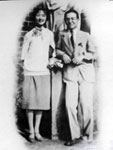Chapter 1 Author's Foreword
Fairbank spent his entire life introducing China to the West from his Harvard University base, and he is often said to have "almost single-handedly created the field of modern China studies in the United States after World War II"①.
I already had a hobby with him when he married me in Beijing in 1932. We were both college graduates in our twenties. He was from South Dakota and I was from Cambridge, Massachusetts. It was there that I met and fell in love. My special hobby at the time was Chinese art, and he liked all aspects of Chinese history.
We settled down in a beautiful courtyard house in Dongcheng, Beijing, found a Chinese teacher, and started to learn the language.In our spare time we visited the Forbidden City or the Buddhist temples in Fragrant Hills, both of which are famous places of interest, but what attracted us more were the towering walls and gate towers, which also surrounded Beijing at that time.Inside the walls, the endless drama of life plays out on the street.For all our joy in our expedition, we were but spectators of those fascinating sights.
About two months after our wedding, we met Liang Sicheng and Lin Huiyin.Neither they nor we thought at the time that this friendship would last for many years, but its first year captivated us both.They were young, admiring each other, and willing to reciprocate our affection for their company.Hui (whei)—the short name she gave herself to her close friends abroad—is especially beautiful and lively.Sicheng is more calm.Polite and responsive, with an occasional eccentric wit, the two were bilingual and well versed in both Eastern and Western cultures.Hui balances her husband's primness with her eloquence and laughter.By exchanging stories about American university life, she soon learned that both of us had studied at Harvard, and Zhengqing came to Beijing when he was a graduate student at Oxford University.This led her to tell some stories about her own year as a student in London.
When we parted, she asked where we lived.We were as surprised as she was to know that their house was not far from us, at the end of the main street at Dongchenggen.We were overjoyed that they were young and lived so close together.
From here, our friendship has grown day by day.We soon learned that Sicheng, who studied Western architecture at the University of Pennsylvania, had begun his research work as China's first architectural historian.This brought him international recognition in later years.Hui was his assistant in architecture, but she is remembered today for the poetry she wrote throughout her life.
Both Sicheng and Hui came from well-known families, and their fathers were both famous.Through them and their friends many fields have been opened to us.We are no longer just passive spectators.And when Zhengqing became a teacher at Tsinghua University the following year, we felt we were truly a part of it.
As the story unfolds, it will be apparent that the four of us have maintained a close friendship over the years.It should come as no surprise that we outlive them.Their lives were spent pursuing their ideal goals through decades of warlord infighting, nationalist revolutions, Japanese invasion, brutal civil wars, and draconian regulations, only to be overwhelmed by their own serious illnesses.This book was written not only to retrace their fate, and so many others, but also to commemorate their achievements, creativity, kindness and sense of humor that supported their courage.
① Proceedings of the American Philosophical Society 137, 2 (June 1993): 282.
① Proceedings of the American Philosophical Society 137, 2 (June 1993): 282.

